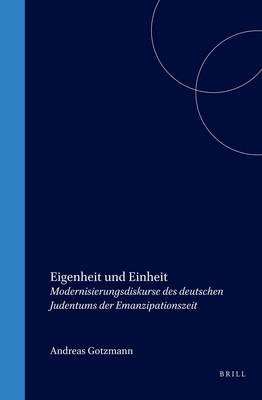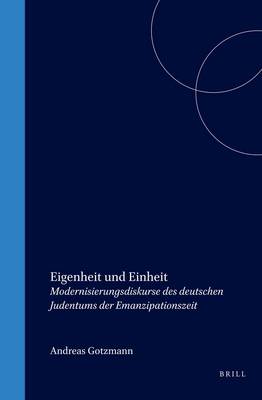
- Afhalen na 1 uur in een winkel met voorraad
- Gratis thuislevering in België vanaf € 30
- Ruim aanbod met 7 miljoen producten
- Afhalen na 1 uur in een winkel met voorraad
- Gratis thuislevering in België vanaf € 30
- Ruim aanbod met 7 miljoen producten
Zoeken
Eigenheit Und Einheit
Modernisierungsdiskurse Des Deutschen Judentums der Emanzipationszeit
Andreas Gotzmann
€ 317,45
+ 634 punten
Omschrijving
Taking as its basis an epistemological culture-historical concept, this book enquires into the independence of cultural self-perception from the ever-changing social models for the interpretation of community. The interacting aspects of unity and uniqueness tied the German Jews into numerous discourses debating their place and recognition in a society defined increasingly in national terms. External demands for distance on the one hand and for integration on the other stimulated the redefinition processes until new, workable concepts emerged of a self-conscious Judaism that was at the same time open to pluralism. These concepts remained marked by the general national discourse of unity, but at the same time developed individual structures for the securing of Jewish identity.
The crucial discourses about, for instance, re-education, the integration of modern historiography as a new cultural interpretative system, and then religio-political attempts to construct models for the relationship between state and religion, are investigated in particular in relation to their dynamics, their perspectives and inherent limitations. Moving beyond outdated crisis-related paradigms of loss as well as assimilation or secularization, an account is given of the specifically Jewish, religious character of the new models suggested for a modern Judaism.
The crucial discourses about, for instance, re-education, the integration of modern historiography as a new cultural interpretative system, and then religio-political attempts to construct models for the relationship between state and religion, are investigated in particular in relation to their dynamics, their perspectives and inherent limitations. Moving beyond outdated crisis-related paradigms of loss as well as assimilation or secularization, an account is given of the specifically Jewish, religious character of the new models suggested for a modern Judaism.
Specificaties
Betrokkenen
- Auteur(s):
- Uitgeverij:
Inhoud
- Aantal bladzijden:
- 324
- Taal:
- Duits
- Reeks:
- Reeksnummer:
- nr. 2
Eigenschappen
- Productcode (EAN):
- 9789004123717
- Verschijningsdatum:
- 15/01/2002
- Uitvoering:
- Hardcover
- Formaat:
- Genaaid
- Afmetingen:
- 164 mm x 243 mm
- Gewicht:
- 721 g

Alleen bij Standaard Boekhandel
+ 634 punten op je klantenkaart van Standaard Boekhandel
Beoordelingen
We publiceren alleen reviews die voldoen aan de voorwaarden voor reviews. Bekijk onze voorwaarden voor reviews.











